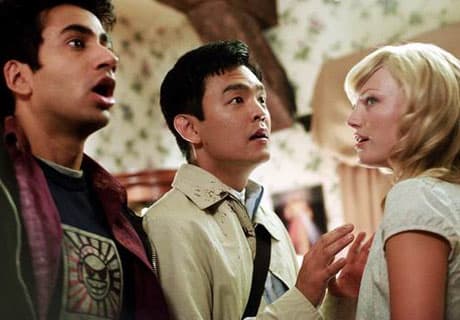Before I launch into a sociological analysis of stoner comedy Harold and Kumar Go to White Castle (directed by the genius who brought us Dude, Where My Car?), let's first acknowledge where this comedy is coming from: there's a feature on the DVD called "The Art of the Fart." In it, sound designer Jeff Kushner illustrates exactly how to get realistic, dramatic fart noises for a "crucial" moment of comedy in the film. It is in the context of stoner comedies that concern themselves with fart vérité that we find Harold (John Cho) and Kumar (Kal Penn), two stoned slackers with munchies only the little burgers from the White Castle chain will satisfy. Off they go, riding CGI cheetahs and fighting off packs of "extreme" sports enthusiasts to satisfy their cravings. In many ways, Harold and Kumar are merely new pawns in an age-old film formula. But wait, there's more. Asian-American Harold and Indian-American Kumar are more than just stoner stand-ins for Cheech and Chong, National Lampoon or the American Pie movies: they are the next step in the evolution of American race relations. Early in the film, Harold reveals an affinity to a John Hughes classic, 16 Candles. But the Hughes film that Harold loves featured one of the worst, most horribly racist characterisations of an Asian man in recent film history. Against that backdrop, Harold and Kumar play out a slightly different version of these stoneo-typical characters. The quest for satisfaction plays out a little differently for these "outsiders" they chase an American dream not just of burger satisfaction, but of acceptance. What they desire is not just snack satisfaction but acceptance into a whole consumptive world of American snack culture. They want their desires for White Castle to be recognised as typically American; their bong is the bong of disaffected teens everywhere, and they won't bogart it from any creed or colour. Too much? Maybe. This is, after all, a film in which Neil Patrick Harris (Doogie Howser, MD) plays an ecstasy-afflicted, sex-crazed version of himself. (And they get to drop a little "Doog, where's my car?" as well.) This is a film that features fantastical burger dreams, visions of lifelong happiness with an animate bag of weed, and the wackiness that comes with an all-night, misadventure-laden road trip. Don't take any of it too seriously. But there's no doubt that, two decades after Long Duk Dong gave Asian men a lifetime of cringe-worthy regret, progress has been made. Plus: cast interviews, commentaries with director and cast, with writers, and "extreme" commentary; deleted scenes. (Alliance Atlantis)
Harold and Kumar Go to White Castle
Danny Leiner

BY James KeastPublished Feb 1, 2005